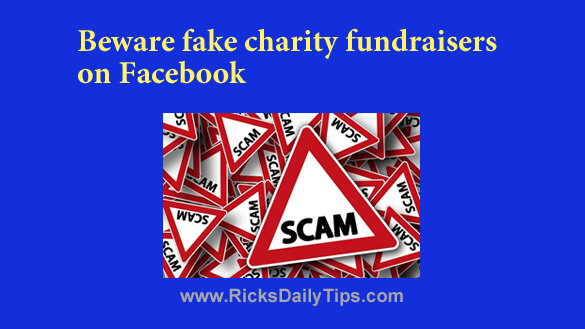
It’s human nature to want to help others in need. And whenever possible, most people believe we should.
Unfortunately, scammers are taking advantage of generous Facebook users by targeting them via fake charity fundraising drives.
These scams take several forms, including the following:
1 – The scammer first builds an authentic-looking, but fake website that’s a knockoff of a well-known charity’s real website. They then purchase ads or place sponsored posts on Facebook requesting donations for some worthy cause.
These fraudulent ads often receive lots of engagement, resulting in a flood of donations via the fake website.
After the scam has run its course the scammer pockets the proceeds, shuts down the fake website and then absconds with the dough.
2 – The scammer finds a Facebook user who has lots of people on their Friends List and clones their account.
They then send friend requests from the fake account to all the “friends” listed on the real account.
After a bunch of the fraudulent friend requests have been accepted the scammer sends private messages to everyone on the fake account’s Friends List requesting donations for some charity. And of course the link they provide is to the fake knock-off charity website.
3 – The scammer clones a popular celebrity’s Facebook page and uses that page to scam folks in the celebrity’s name, again directing donors to the fraudulent charity website.
Luckily, these scams are usually easy to recognize if you know what to look for.
First, check to make sure the website the fundraising message links to is actually the charity’s official website. Just Google the exact name of the charity and their official website will almost always come up first in the search results.
Important: Make sure you look at the actual search results, not the list of ads that are displayed above the search results.
An ad for a fraudulent website will always be displayed above the real website on the Google search results page because ads are displayed above the actual search results. Ignore any links that are ads and go directly to the listing for the charity’s official website in the actual search results and make your donation from there.
Next, if you see a fundraising campaign that appears to have been created by a well-known celebrity, visit that celebrity’s Facebook page directly and look for the blue check mark beside the page name.
If you don’t see a blue check mark that’s a pretty clear indication that the page is a fake.
And finally, you can safely assume that any request for donations you receive in an instant message is a fake.
Charities and celebrities aren’t going to send out floods of IMs in order to solicit donations. They just won’t.
It’s a lot more efficient for them to simply purchase an ad or post the solicitation on their verified account’s Timeline.
Bottom line: Fraudulent charity scams are common on the Internet. Always be sure to thoroughly check out every fundraising drive you might want to participate in before taking the plunge.
Ans always remember this…
Once a scammer has your card information and personal info the damage can go far beyond that one fraudulent campaign.
If you are ever in doubt about the legitimacy of a donation request, visit the charity’s official website directly and donate from there.
To finish up, this short video provides several other tips for avoiding charity scams. Check it out: